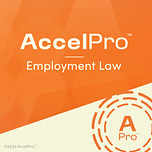We hope you’re finding value in our weekly expert interviews and series of events. Your engagement and feedback shape the topics we cover and the career products we offer. Sign up now, and your annual membership will include a free trial and a discount of more than 40%.
Welcome to AccelPro Employment Law, where we provide expert interviews and coaching to accelerate your professional development. Today, we are featuring a discussion with Joe Beachboard about COVID and employment law.
Beachboard, who has practiced employment law for 35 years, is the Chief Concierge Attorney at Beachboard Consulting Group and former Managing Director of Ogletree Deakins. He says the long-term ramifications of COVID on employment law are only beginning to emerge. Remote work, policies and performance management have all undergone, and are still in the midst of, significant change.
“These things are going to take years, maybe decades, to work their way through the courts,” he says. “I don’t think in any way we can say we’ve reached a new normal. We’ve got a long way to go. There’s a lot of questions that still need to be answered.”
This week, we are rolling out our paid membership program. The benefits of joining:
The weekly podcast available in the player of your choice
Transcripts and supplemental materials for each interview
Private group events inspired by your topic and expert requests
Curated collections from the archive, including Unions and Discrimination
CLE credit based on the interviews is coming soon
If you sign up now, your annual membership will include a free trial and a discount of more than 40%.
Of course, you’re welcome to stick with your free subscription. With that, you’ll receive one full interview each month, along with samples of the weekly podcast. And occasional events will be open to everyone.
Most AccelPro members expense their memberships or take a tax deduction. Please let us know if your employer has any questions about our community.
Interview References:
Joe Beachboard’s Beachboard Consulting Group profile.
Supplemental Materials:
Beachboard, Joseph and Claxton, Linda. California COVID-19 Series: Employment Litigation During the COVID-19 Pandemic. The National Law Review.
TRANSCRIPT
Matt Crossman, Host: We’re going to talk about the lasting impact of COVID and employment law. Before we get there, I have a few background questions. You are the Chief Concierge Employment Attorney at Beachboard Consulting Group. What is a Chief Concierge Employment attorney?
Joe Beachboard: I spent 25 years in two of the biggest law firms in the world. In between the two, I also had 10 years as the CEO of a legal publishing company. And about a year ago, I decided I wanted to try to do something different. And that was to work with a limited number of clients on a very integral basis as part of their business.
Everybody knows what concierge medicine is, right? It’s the same concept as concierge medicine, just applied to employment law. I have a limited number of clients that I work very closely with. I enjoy each of them and what they do. It’s a great joy for me at this stage of my career to have that opportunity.
MC: One of the issues that you work with them on is the impact of COVID, and we’re going to dive into three topics. Remote work is one, handbooks and policies is two, and performance management is three. And we’re going to use a “do this, don’t do that” formula to give actionable advice.
I want to talk a little bit about context. Depending on the COVID issue you’re talking about, sometimes it’s past tense, sometimes it’s present tense. In the employment law context, have we reached a new normal, or are we still going through upheaval?
JB: I don’t think we’re close to reaching a new normal yet. There are so many questions yet to be answered. Just practically, not to mention legally, these things are going to take years, maybe decades, to work their way through the courts. I don’t think in any way we can say we’ve reached a new normal. We’ve got a long way to go. There’s a lot of questions that still need to be answered.
MC: One of those questions is topic No. 1, remote work. Your first bit of advice is our first don’t: “Don’t ignore pandemic ramifications with remote work.” What were those ramifications at first? And what are they now?
JB: Employers really have to figure out how they want to handle this issue. The mistake is ignoring the issue, right? I see companies that are just hanging back and saying, OK, we’re going to see how this all shakes out. What I’m finding is that by doing that, you create anxiety among your employees, and anxiety is not a good thing for retention. And despite whatever some of the numbers say in terms of available workers, we are in a battle for talent.
If you create anxiety, if people don’t know what the future is going to be at this company, they will find a company where they know what that future is, and that’s where they will migrate, and when that happens, you lose very valuable people.
The message that I would have is, you need to think through this issue, and you need to make a thoughtful decision as to what your policy is going to be, and then let’s tackle the legal issues, because no matter which one of those approaches you take, there’s going to be legal issues.
And then you tackle those after you decide what our approach is.
MC: If I’m an HR exec trying to think through that, what advice do you give me?
JB: What you need to be thinking about in some ways, of course, is the nature of your business. You have to start there, right? Certain businesses, people just have to be at the workplace. If you run a Starbucks, your employees have to come in. But there are other businesses where it makes total sense to have somebody remote, maybe like you, Matt, where you have that ability to work in a remote environment.
I think certain employers are going to immediately divide up into those two groups. And then there’s everybody else. And everybody else is really going to have to analyze what’s important to them as an organization.
Do we need people to be in the office? In my last years at my last law firm, Ogletree Deakins, I was the managing director of the firm through COVID, and we had to struggle with this issue of how important is it for people to be in the office versus to work from home?
Listen to this episode with a 7-day free trial
Subscribe to AccelPro | Employment & Labor Law to listen to this post and get 7 days of free access to the full post archives.












